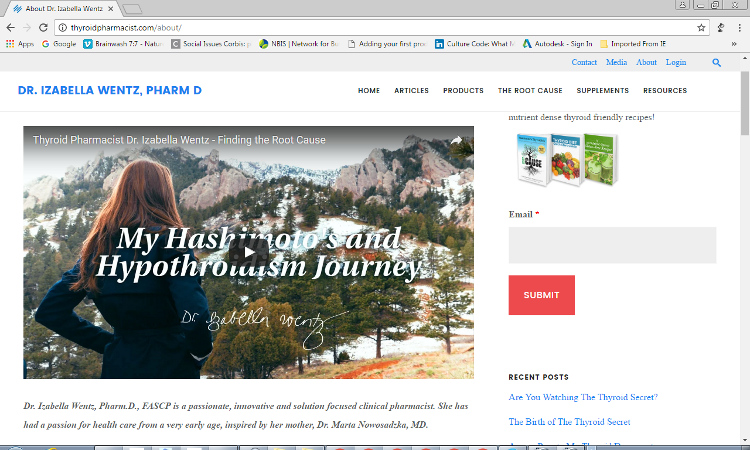It was just over a year ago, when I was starting out in a busy suburban pharmacy as a professional services pharmacist, when I noticed something a bit weird…literally every second person I spoke with for about a full week was on thyroxine tablets.
I stared back at these patients.
A lot of them were female, but not all. Many of the clients were business owners themselves or in demanding high-stress roles.
Or parents or grandparents of such people.
Several of them had other endocrine and gut conditions in the background as well.
A small handful of them, but not many, were able to tell me that their specific diagnosis was Hashimoto’s Thyroiditis, a particularly nasty type of hypothyroidism where elevated thyroid peroxidase and/or thyroglobulin antibodies allow the immune system to attack and try to shut down the thyroid gland. It has been suggested that up to 95% of patients with hypothyroidism also have Hashimoto’s disease1.
After doing a fair bit of personal research, a sad reality emerged. Many patients may never learn if they have Hashimoto’s or not if their doctor does not order the full suite of thyroid tests, as opposed to just testing for thyroid stimulating hormone (TSH). To add insult to injury, many patients are informed that the only thing they can do in the event of an underactive thyroid is to take synthetic thyroxine and wait patiently for their thyroid glands to stop working.
Hardly a rosy outlook, but that’s what they get told. How do I know this? I also received the same spill from my new (and otherwise semi-decent) GP several weeks ago. I wonder if he dishes out the same advice to the many women out there with fertility issues, trialling a whole host of expensive and/or invasive treatments in the absence of an initial thyroid screen? What about expectant mothers with thyroid issues?2, 3, 5
One of the challenges with managing a disease that is merely considered an “endocrine problem” and lacking in the same level of awareness as its famous cousin, diabetes, is that related signs and conditions get overlooked and are often managed in a fragmented manner. Many regular sufferers with poorly controlled hypothyroid conditions experience fatigue, irritable bowel syndrome, gastroesophageal acid reflux disease, nutrient deficiencies/malabsorption and psychological issues without being informed of the well-documented relationship these conditions can have with their underactive thyroid.
But fear not!
Above: Screenshot from thyroidpharmacist.com
In comes Thyroid Pharmacist4, Dr. Izabella Wentz, one of several north American-based health bloggers and authors who focus on thyroid health. She’s a US pharmacist with a very interesting story with her own thyroid journey and a strong following on social media.
And why not?
It’s a great way to reach out to the masses. After all, some of my more informed customers did not learn the ins and outs of managing their thyroid disease from their local GP, endocrinologist or pharmacist. They usually turned to the internet or a naturopath for holistic management and care.
It is very fortunate for consumers that there are several reliable sources of online information, including bloggers from both the healthcare (Thyroid Pharmacist) and patient spectrum (Hypothyroid Mom5) spreading helpful information in an engaging way.
While it is quite a task compiling all the anecdotal and scientific information together into accessible means and practical steps for consumers online, at the end of the day there is no substitute for face-to-face clinical encounters in conjunction with patient self-management.
It’s also comforting to for patients to know that the people in charge of their health are keeping up with the latest developments and knowledge advances in managing complex conditions.
Lessons learned from Thyroid Pharmacist:
- Health care professionals including pharmacists can exercise leadership in gaps in chronic disease care for complex conditions like Hashimoto’s Hypothyroidism.
- Effective thyroid disease care has the potential per customer to generate revenue in a similar league as that for patients with diabetes and might be more common than originally thought (but simply underdiagnosed).
- The internet is increasingly filling a gap for patients with very complex and unresolved conditions looking for answers.
- Emerging evidence is (slowly) bridging the divide between traditional and alternative medicine.
- Patients are looking for information that is detailed, personalised but it must also demonstrate empathy.
Implications for community pharmacies in Australia:
- As pharmacists, we are the health care professionals responsible for the safe and effective use of treatments in health care. In general, pharmacies need to be agiler and more responsive to patient needs in order to remain relevant or position themselves as partners in their health.
- Thyroid disease is one example where individual pharmacies and pharmacists can take the initiative to help the community and simultaneously build a more sustainable business, where patients find what we tell them as helpful expertise.
- Sadly, we as a profession lag when it comes to leading the way in chronic disease care and new leads. We tend as a profession to wait for developments in other, better-coordinated disciplines (Nursing for example) to fill the vacuum for chronic conditions, such as diabetes education.
- A lack of initiative on the frontline by us erodes both clinical and business opportunities for our profession.
- Pharmacists and staff on the ground are crucial front-line team members with the capacity to identify and develop new opportunities for patients to better meet the needs and wants of our current customers and future clients.
While it is great to continue supporting well-known initiatives that already receive a lot of media attention, is there also something else you and your team notice about your clients where you could make a difference?
References
1 Wentz, Izabella (2015). Do You Have Hypothyroidism or Hashimoto’s or Both? Available from: http://thyroidpharmacist.com/articles/do-you-have-hypothyroidism-or-hashimotos-or-both/
2Haymart, M. R. (2010). The Role of Clinical Guidelines in Patient Care: Thyroid Hormone Replacement in Women of Reproductive Age. Thyroid, 20(3), 301–307. Available from: http://doi.org/10.1089/thy.2009.0321
3Garber JR. et al. (2012) Clinical practice guidelines for hypothyroidism in adults: cosponsored by the American Association of Clinical Endocrinologists and the American Thyroid Association. Endocr Pract. Nov-Dec 18(6):988-1028 Available from: https://www.aace.com/files/final-file-hypo-guidelines.pdf
4 Thyroid Pharmacist. Available from: http://thyroidpharmacist.com/
5 Hypothyroid Mom. Available from: http://hypothyroidmom.com/

